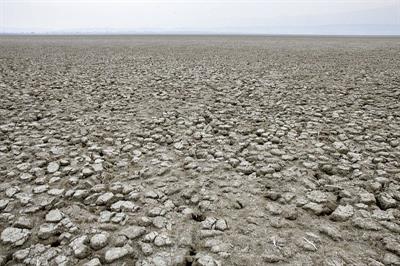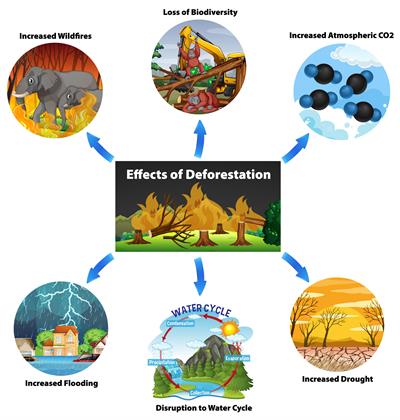PDF chapter test TRY NOW
Effects of deforestation:
There is interdependence between the forests and human. Human survival without forests is difficult as the trees supply oxygen() that we need, cause rainfall and provide things required for life. Due to the increase in population, there is deforestation and destruction of forests.
Nearly each year 1.1 crore hectares of forests have been cut down around the world. In India, roughly 10 lakh hectares of forests are destroyed, which resulted in many harmful effects.
Some of the effects include:
1. Species extinction - Deforestation causes loss of species of plants, animals, and few are in the verge of extinction. More than 80 \% of world's species are present in the tropical rainforest, and nearly 50 to 100 species of animals are lost each day due to destruction of habitats.
2. Soil erosion - The trees in forests protects the soil from the sun's heat. Deforestation causes exposure of the lower layers, and thus the soil is exposed to sun's heat. Extreme temperature of summerdries the moisture content that evaporates the nutrients.
The high temperature affects the bacteria, which helps in the breakdown of the organic matter. The tree roots help retain water and hold the topsoil, which provides nutrients to plants.
When trees are cut, the soil is eroded and washed away along with nutrients. Deforestation thus cause removal of topsoil or soil erosion and humus, leading to loss of fertile soil. Loss of fertile soil does not support plant growth which leads to desertification.
The process, where fertile land becomes a desert, is called desertification.

Desertification
3. Water cycle - Trees absorb water from roots and release water into the atmosphere in the form of water vapour during transpiration. Deforestation causes a decrease in the amount of water vapour released, and thus there is decreased rainfall. Deforestation, therefore, affects the water cycle, which reduces the rainfall and may cause droughts.
4. Floods - Trees absorb large amount of water with roots. Deforestation decreases the water holding capacity and reduce the infiltration rate of soil (movement of water from the soil surface to the ground). This causes frequent flooding of the rivers that causes loss of life as well as property. Deforestation, thus, disrupts the flow of water and leads to the flooding in some areas.
5. Global warming - Animals inhale and releasecarbon dioxide () in the atmosphere as waste. Trees use and provides us with oxygen through the process of photosynthesis. Deforestation causes reduction of trees which cause accumulation of carbon dioxide in the atmosphere.
with water vapour, methane, nitrous oxide, and ozone forms greenhouse gases. These gases are responsible for global warming. The solar energy that falls on the earth’s surface is reflected into the atmosphere. The greenhouse gases reflect a part of energy back to the earth to keep it warm, and a part goes into the space.
Gases such as methane and carbon dioxide accumulating in the atmosphere trap the heat energy inside the atmosphere leading to an increase in temperature. This is called global warming. This results in the melting of glaciers in the polar region and affects the living organisms like polar bear.

Greenhouse effect
6. Destruction of habitat - Indigenous people, live and depend on forests for survival. They get food and other resources from forests. Deforestation thus affects their livelihood.
7. Destruction of forests causes shortage of forest products that include medicinal products, wood, etc.

Effects of deforestation
Reference:
https://enhancedgreenhousegasemissions.weebly.com/enhanced-greenhouse-gas-effect.html
